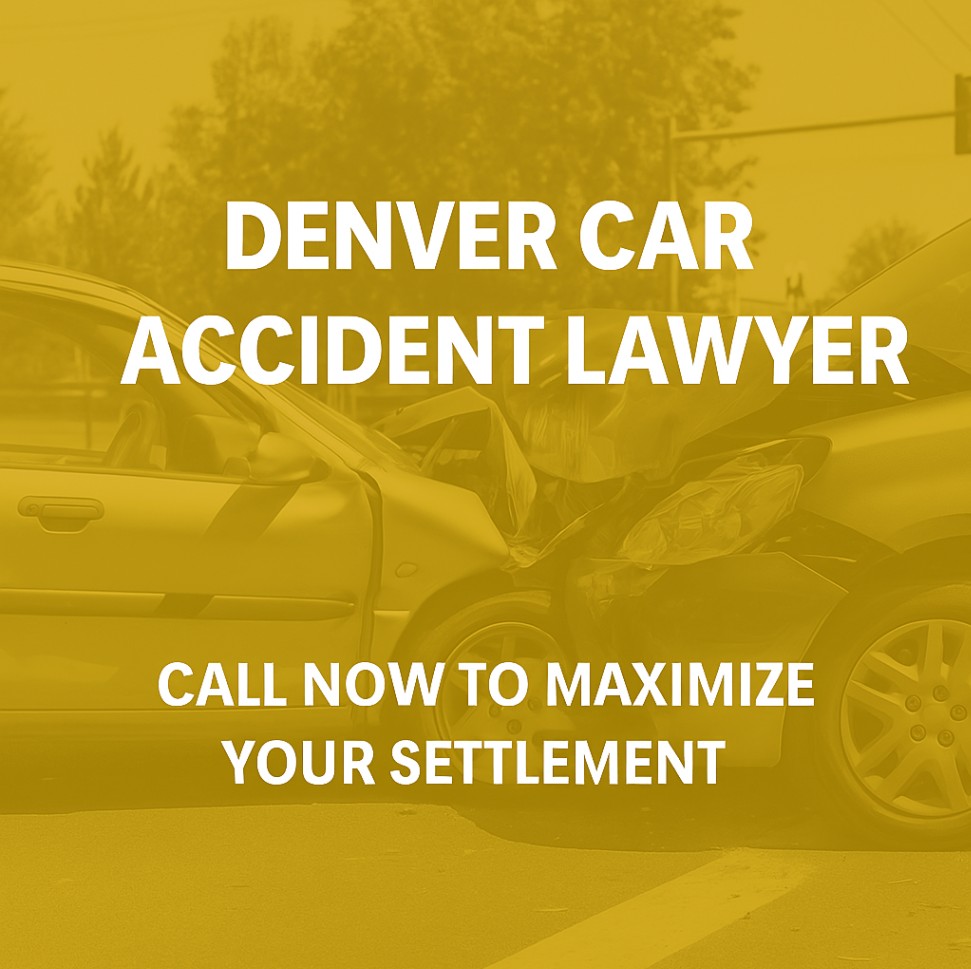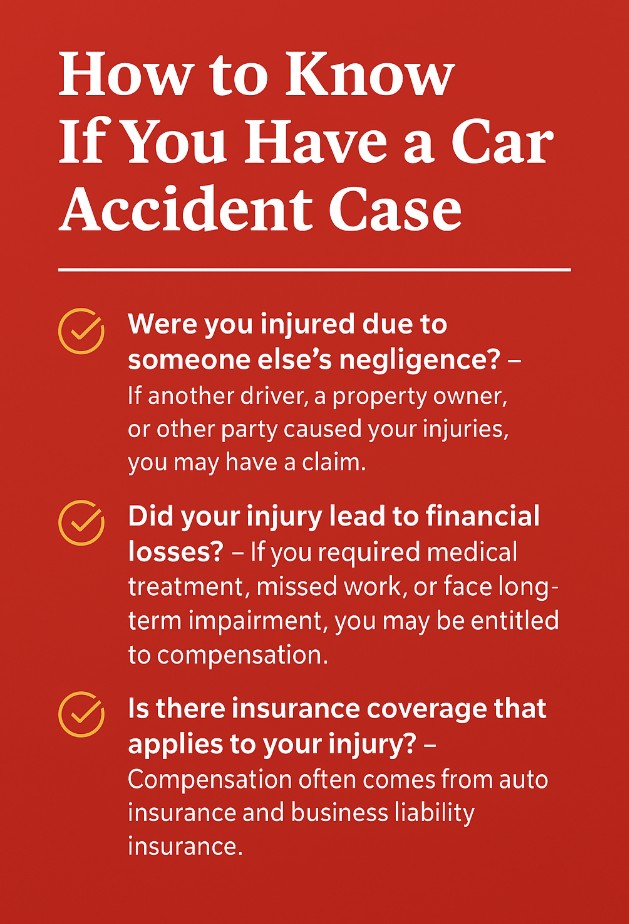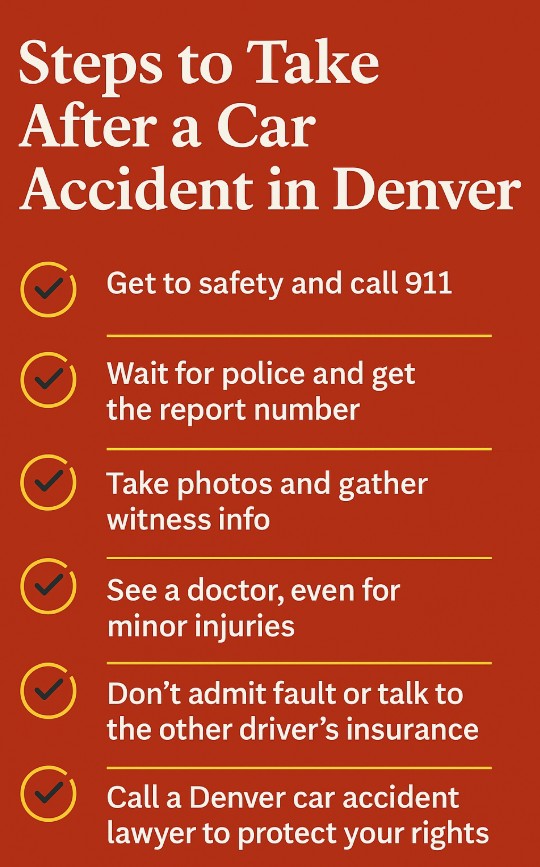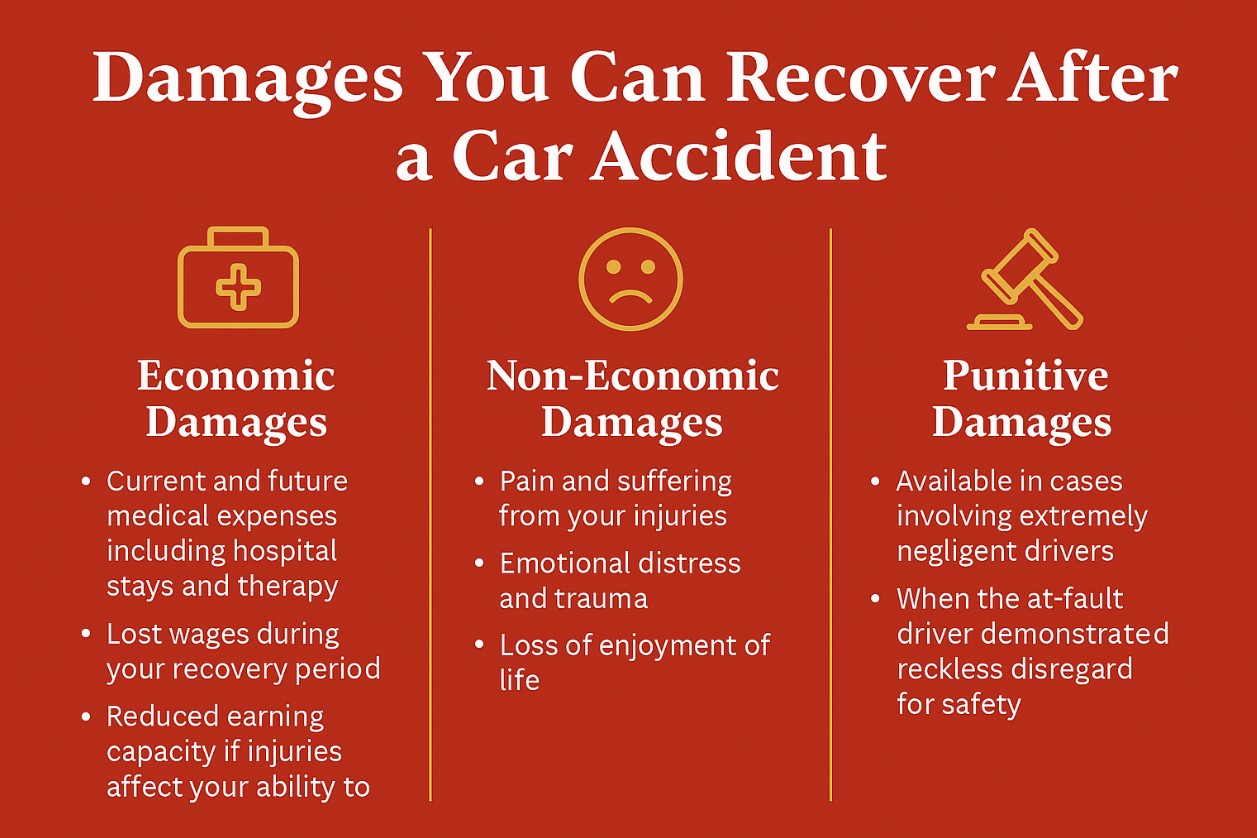Denver Car Accident Lawyer
If you or someone you care about has been injured in a car accident, our Denver personal injury lawyers are here to help.
We fight for real results — not just quick settlements — and we’re committed to helping injury victims get the compensation they need to recover. From handling the insurance companies to guiding you through every step of the legal process, we’re on your side from day one.
Contact us today for a free consultation or call us directly at (720) 770-3832.

Injured in a Denver Car Crash? Get Maximum Compensation
- Car accidents can happen to anyone in Denver, causing serious injuries and devastating financial consequences
- Thousands of motor vehicle accidents occur in the Denver metro area annually, making them a leading cause of injury and death
- Our experienced legal team helps car accident victims navigate the complex process of recovering the compensation they deserve
- Contact us today for a free consultation and case evaluation
How to Know If You Have a Car Accident Case
- Were you injured due to someone else’s negligence? – If another driver, a property owner, or other party caused your injuries, you may have a claim.
- Did your injury lead to financial losses? – If you required medical treatment, missed work, or face long-term impairment, you may be entitled to compensation.
- Is there insurance coverage that applies to your injury? – Compensation often comes from auto insurance and business liability insurance.
If you’re unsure whether you have a case, call (720)-770-3832 for a free consultation. We’ll review your situation, provide clear legal advice, and give you the information you need to make an informed decision.

Why Hire a Denver Car Accident Lawyer Immediately After an Accident
If you’ve just been in a car accident in Denver, here’s why you need legal help right away:
- The first hours after a serious car accident in Denver are critically important—not just for your health, but for your legal and financial recovery.
- Evidence at the scene can disappear quickly, especially on busy city streets. Skid marks fade, vehicles are moved, and witnesses may leave before anyone gathers their statements. Preserving this evidence early is key to proving fault.
- Proper medical documentation is essential. Even if your injuries seem minor, getting checked by a doctor creates a clear record that supports your claim and connects your injuries to the accident.
- Insurance companies act fast—and not in your favor. Their goal is to minimize payouts, not to protect you. They often reach out quickly after an accident hoping to get a recorded statement that can be used to reduce or deny your claim.
- Be careful what you say. Many accidents are caused by human error, and something as simple as saying “I’m fine” could be used against you later. It’s always best to speak with a lawyer before giving any statements to the other driver’s insurer.
- Colorado’s comparative negligence laws can reduce your compensation if you’re found partially at fault. That’s why having an experienced Denver car accident lawyer on your side from the beginning makes all the difference.
Denver’s Unique Challenges for Car Accident Victims
Evidence at Denver accident scenes—especially on high-traffic city streets (where 61% of crashes occurred)—disappears fast. Traffic cameras, witness information, and vehicle positioning are crucial and need to be preserved. Although 13,088 crashes occurred during clear weather, this shows driver error and negligent driving are major contributors to most Denver car crashes.
Denver Insurance Companies Act Fast
Many Denver residents don’t realize that Colorado’s fault-based insurance system means insurance companies are financially incentivized to devalue your car accident claim as soon as it’s filed. Insurance adjusters are trained to protect the company—not you—while you’re managing the physical and emotional impact. In 2024, 74.5% of crashes caused property damage only, while 25.2% led to injuries, giving insurers a strong reason to settle for less than you deserve.
The Real Impact on Denver Residents
You may be dealing with medical expenses, lost wages, and property damage—all while recovering from your car accident injuries. Proving liability is especially difficult when multiple drivers, distracted driving, or aggressive driving are involved. For example, aggressive driving caused 1,037 crashes, and distracted driving contributed to more than 1,400 accidents. You need a Denver car accident lawyer who understands how to build a strong case quickly.
Denver’s Legal System Requires Experienced Navigation
A skilled Denver car accident attorney knows how to navigate Colorado’s comparative negligence laws, determine fault for the accident, and handle communication with the other driver’s insurance company. Our legal team identifies key evidence, gathers police reports, and ensures you aren’t taken advantage of by insurance providers.
We Handle the Legal Process, So You Can Focus on Recovery
Our Denver personal injury team will:
- Handle all communication with the driver’s insurance company
- Properly document your injuries and medical care
- Fight for fair compensation under Colorado law
- Pursue damages for pain and suffering, future medical expenses, and lost income
- Work on a contingency fee basis — you don’t pay unless we win
Why Choose Our Denver Car Accident Attorneys
- Dedicated experience helping car accident victims throughout Denver, Colorado
- Proven track record of successful settlements and verdicts for our clients
- Deep understanding of Colorado car accident laws and insurance claims procedures
- Your case is handled directly by an experienced attorney from start to finish
- We work on a contingency fee basis – you pay nothing unless we win your case
When you’re dealing with the aftermath of a car accident in Denver, experience matters. At Fuller Personal Injury Law, our attorneys are fully dedicated to helping car accident victims across Denver, Colorado navigate the most challenging time of their lives.
We have a proven track record of securing successful settlements and verdicts for injured clients — including those facing complex claims involving serious injuries, disputed liability, and insurance company delays. Our firm brings a deep understanding of Colorado car accident laws and the insurance claim process, giving you a major advantage from day one.
Unlike many firms, we don’t pass your file off to a case manager or junior associate. Your Denver car accident case will be handled directly by an experienced attorney who knows how to maximize compensation and protect your rights every step of the way.
And you never have to worry about upfront costs. We work on a contingency fee basis, meaning you pay nothing unless we win your case.
https://youtu.be/1Ah149AE5GQ?si=jRx6UMG59ry7vI44
Reviews from Our Denver Clients
Steps to Take After a Car Accident in Denver
The moments after a crash can be overwhelming, but the right steps can protect your health, your legal rights, and your future claim.
- Ensure Your Safety and Call for Emergency Help
Move to a safe location if possible. Call 911 right away so police and medical personnel can respond. - Wait for Police and Get the Report Number
Stay at the scene. When officers arrive, answer their questions truthfully and ask for the police report number—you’ll need it later. - Document the Scene
Take clear photos of the vehicles, road, traffic signs, and any visible injuries. If there are witnesses, get their contact information. - Get Medical Attention
Even if you feel okay, seek medical care. Some injuries may not show symptoms immediately, and having a medical record helps your case. - Don’t Admit Fault or Talk to the Other Driver’s Insurance
Be polite, but don’t discuss fault. Anything you say could be used against you by the insurance company. - Call a Denver Car Accident Lawyer
An experienced lawyer can guide you through your next steps, deal with the insurance companies, and fight for the compensation you deserve.

Damages You Can Recover After a Car Accident
Economic Damages
- Current and future medical expenses including hospital stays and therapy
- Lost wages during your recovery period
- Reduced earning capacity if injuries affect your ability to work
- Vehicle repairs and property damage compensation
Non-Economic Damages
- Pain and suffering from your injuries
- Emotional distress and trauma
- Loss of enjoyment of life
Punitive Damages
- Available in cases involving extremely negligent drivers
- When the at-fault driver demonstrated reckless disregard for safety

Common Causes of Car Accidents in Denver
Based on the 2024 Colorado Department of Transportation data, Denver experienced 15,256 car accidents within city limits alone. The analysis reveals several key factors contributing to these crashes:
- Distracted Driving: Interior and exterior distractions contributed to 1,410 crashes in Denver (898 interior distractions and 512 exterior distractions), making up 5.85% of all identified contributing factors.
- Aggressive Driving: This dangerous behavior was directly linked to 1,037 Denver accidents (4.30% of identified contributing factors), showing the significant risk posed by road rage and impatient driving on Denver’s congested streets.
- Failure to Observe: “Looked/Did Not See” was cited in 1,768 Denver crashes (7.34% of identified contributing factors), highlighting the critical importance of maintaining vigilance, especially on busy city streets where 9,321 accidents (61.10% of all Denver crashes) occurred.
- Driver Inexperience: Contributed to 457 accidents in Denver (1.90% of identified factors), with an additional 376 crashes (1.56%) attributed to age/driver ability issues, demonstrating the dangers of inexperienced drivers navigating Denver’s complex traffic patterns.
- Weather Conditions: While most Denver crashes (13,088 or 85.79%) happened in clear conditions, winter weather still played a significant role with 391 snow-related crashes, 259 on icy roads, and 159 on snowy surfaces.
- Time Factors: Denver’s crash data shows Tuesday as the most dangerous day with 2,506 crashes (16.43% of all accidents), while August had the highest monthly total with 1,450 accidents (9.50%).
- Location Patterns: City streets proved most hazardous with 9,321 crashes (61.10%), followed by state highways with 3,205 crashes (21.01%) and interstate highways with 2,658 crashes (17.42%), highlighting where Denver drivers face the highest risks.
- Understanding these Denver-specific accident causes is essential for both preventing crashes and establishing liability in car accident claims.
Common Car Accident Injuries We Help With
At Fuller Personal Injury Law, we understand the profound impact that car accident injuries can have on your life. Our experienced attorneys are dedicated to helping victims in Denver navigate the complexities of personal injury claims, ensuring they receive the compensation they deserve. Below are some of the most common injuries we handle:
Whiplash and Neck Injuries
Whiplash is a prevalent injury resulting from the sudden jerking motion of the head and neck during a collision. Symptoms can include neck pain, stiffness, headaches, and dizziness. While many recover within weeks, some individuals experience chronic pain and reduced mobility.
Broken Bones and Fractures
The force of a car accident can lead to fractures in various parts of the body, including arms, legs, ribs, and collarbones. These injuries may require surgical intervention and extensive rehabilitation.
Traumatic Brain Injuries (TBIs)
TBIs occur when the brain is subjected to sudden trauma, often due to a blow to the head during a crash. Symptoms range from mild concussions to severe cognitive impairments, affecting memory, concentration, and emotional well-being.
Spinal Cord Injuries and Paralysis
Injuries to the spinal cord can result in partial or complete paralysis, significantly altering an individual’s quality of life. These injuries often necessitate long-term medical care and adaptive living arrangements.
Internal Injuries and Bleeding
Blunt force trauma from car accidents can cause internal injuries, such as organ damage and internal bleeding. These conditions may not be immediately apparent but can be life-threatening if not promptly treated.
Soft Tissue Injuries
Soft tissue injuries, including sprains, strains, and tears to muscles and ligaments, are common in car accidents. While they may seem minor, these injuries can lead to chronic pain and mobility issues if not properly addressed.
Severe Injuries Requiring Long-term Care
Some accidents result in catastrophic injuries that demand ongoing medical attention, rehabilitation, and support. These may include multiple fractures, severe burns, or amputations, all of which can have lasting physical and emotional effects.
Fatal Injuries Leading to Wrongful Death
Tragically, some car accidents result in fatalities. In such cases, our firm assists families in pursuing wrongful death claims to seek justice and financial compensation for their loss.
Types of Car Accidents We Handle
At Fuller Personal Injury Law, we have extensive experience handling a wide range of car accident cases in Denver. Our dedicated team is committed to providing personalized legal support to help you navigate the aftermath of any collision. Here are some of the common types of car accidents we handle:
Rear-End Collisions
Rear-end collisions occur when one vehicle crashes into the back of another. These accidents are often caused by distracted driving, tailgating, or sudden stops. Injuries can range from minor whiplash to more severe spinal injuries.
T-Bone/Intersection Accidents
Also known as side-impact collisions, T-bone accidents typically happen at intersections when a driver fails to yield or runs a red light, striking the side of another vehicle. These crashes can result in serious injuries due to the limited protection on the sides of vehicles.
Head-On Collisions
Head-on collisions are among the most dangerous types of accidents, often resulting in severe injuries or fatalities. They usually occur when a driver crosses the center line or drives the wrong way on a one-way street.
Multi-Vehicle Pileups
Multi-vehicle accidents involve three or more vehicles and are common on highways and freeways. These pileups can be complex, with multiple parties sharing fault, making legal representation crucial to navigate the claims process.
Motorcycle Accidents
Motorcyclists are particularly vulnerable on the road. Accidents involving motorcycles can lead to catastrophic injuries due to the lack of protective barriers. We advocate for motorcyclists’ rights and work to secure fair compensation for their injuries.
Hit and Run Incidents
Being involved in a hit and run can be traumatic and confusing. Our firm assists clients in identifying the responsible parties and pursuing compensation through uninsured motorist coverage or other legal avenues.
Collisions with Stationary Objects
Accidents involving collisions with stationary objects, such as trees, poles, or barriers, can result from swerving to avoid another vehicle or losing control due to road conditions. These incidents can cause significant injuries and property damage.
Severe Crash Scenarios
We handle cases involving severe crash scenarios, including rollovers, high-speed collisions, and accidents resulting in life-altering injuries or fatalities. Our team is experienced in managing complex cases that require thorough investigation and expert testimony.
If you or a loved one has been involved in any of these types of accidents, contact Fuller Personal Injury Law for a free consultation. We’re here to help you understand your rights and pursue the compensation you deserve.
Who Can Be Held Liable for Your Car Accident?
The Negligent Driver
The most common liable party is the at-fault driver whose negligence caused the crash. According to 2024 Denver crash data, driver negligence takes many forms:
- 1,768 crashes occurred because drivers “Looked/Did Not See” other vehicles or hazards
- 1,037 crashes resulted from aggressive driving behaviors
- 898 crashes were caused by interior distractions like phone use or eating
- 512 crashes involved exterior distractions
Multiple Parties in Complex Cases
Denver’s 15,256 crashes in 2024 often involved complex liability scenarios where multiple parties share responsibility:
- Vehicle Owners: When different from the driver, owners who permitted an unlicensed or impaired person to drive their vehicle
- Commercial Vehicle Companies: Employers of commercial drivers in the 438 crashes involving heavy trucks (GVWR over 16,001)
Dealing With Insurance Companies After an Accident
Insurance companies aren’t on your side after a crash. Their goal is to minimize payouts — even when you have a valid claim. That’s why knowing how to handle these conversations (or when not to speak at all) is essential.
Never Provide a Recorded Statement
The other driver’s insurance adjuster may ask for a recorded statement. Don’t do it. These statements are often used to twist your words and weaken your claim.
Let Us Handle All Communication
Our attorneys deal directly with insurance companies so you don’t have to. We know their tactics and push back against pressure, delays, and misinformation.
What to Do If the Other Driver Is Uninsured
If the at-fault driver has no insurance, we’ll help you explore alternative options like uninsured motorist coverage or third-party liability.
Cooperating With Your Own Insurer
We guide you on what to say and what to avoid when filing with your own insurance company. It’s important to protect your rights even in those conversations.
Fighting Back Against Lowball Offers
Insurers often make early settlement offers that don’t come close to covering your costs. We negotiate aggressively to demand the compensation you’re entitled to.
Why Insurance Companies Deny Claims
Many valid claims are denied due to vague policy language or technicalities. We know how to challenge those denials and present strong evidence to support your case.
Denver Car Accident Statistics and High-Risk Areas
Every year, thousands of motor vehicle accidents occur across Denver and the surrounding metro area. From rear-end collisions on I-25 to high-speed crashes along Colfax Avenue, the data paints a clear picture: Denver drivers face real risks on the road.
Most Frequent Causes of Crashes in Denver
According to local traffic reports, the most common causes of car accidents in Denver include distracted driving, speeding, impaired driving, and following too closely. In many cases, these behaviors result in preventable collisions that leave victims with serious injuries, medical expenses, and lost income.
High-Risk Intersections and Roadways
Certain locations in Denver see disproportionately high crash volumes. Among the most dangerous intersections and corridors are:
- Federal Boulevard & West Alameda Avenue
- Colfax Avenue & Colorado Boulevard
- I-70 at the I-25 interchange
- Speer Boulevard during rush hour
These areas are known for heavy traffic, confusing merges, and frequent stop-and-go conditions.
Most Common Types of Collisions
The Denver metro area reports a high number of rear-end collisions, left-turn crashes, and side-impact (T-bone) accidents. These often happen at intersections or on major arteries where visibility or timing becomes an issue.
Leading Factors in Severe and Fatal Accidents
Speeding, intoxicated driving, and red-light violations remain leading contributors to catastrophic and fatal crashes. Many of these accidents happen at night or during poor weather conditions when road visibility and traction are compromised.
Dangerous Conditions on Major Denver Roads
Heavy congestion on I-25, inconsistent signage, poor road maintenance during winter months, and sudden lane shifts in construction zones all contribute to higher accident rates in key areas of the city. Drivers navigating downtown Denver, I-225, or U.S. 6 should remain especially cautious.
What Sets Our Denver Auto Accident Attorneys Apart
At Fuller Personal Injury Law, we provide more than just legal representation—we offer unwavering support and personalized attention to each client. Our commitment to excellence distinguishes us in the Denver legal community.
Conveniently Located for Denver Residents
Our office is centrally located at 1580 Lincoln Street, Suite 200, in the heart of Denver, CO 80203. This prime location ensures easy accessibility for clients throughout the Denver metro area, facilitating in-person consultations and meetings.
Specialized Focus on Car Accident Injury Cases
We concentrate exclusively on personal injury law, with a particular emphasis on car accident cases. This specialization allows us to stay abreast of the latest legal developments and strategies pertinent to motor vehicle accidents, ensuring our clients receive informed and effective representation.
Collaborations with Medical Experts
Understanding the medical aspects of car accident injuries is crucial. We collaborate with a network of medical professionals to thoroughly assess injuries, provide expert testimony, and substantiate claims. This comprehensive approach strengthens our clients’ cases and aids in securing appropriate compensation.
Commitment to Securing Maximum Compensation
Our firm is dedicated to pursuing the full compensation our clients deserve. We meticulously evaluate each case to identify all potential sources of recovery, aiming to cover medical expenses, lost wages, pain and suffering, and other related damages.
Managing Legal Complexities for Client Peace of Mind
Navigating the legal aftermath of a car accident can be overwhelming. We handle all legal aspects of our clients’ cases, from filing claims to negotiating with insurance companies, allowing them to focus on recovery and well-being.
Proven Track Record with Complex Accident Cases
Our firm has a history of successfully managing intricate car accident cases, including those involving multiple parties, severe injuries, and disputed liability. Our experience and strategic approach have led to favorable outcomes for numerous clients.
Frequently Asked Questions About Car Accidents in Denver
What should I do immediately after a car accident?
Call 911, get medical help, and document the scene. Take photos, get witness names, and avoid admitting fault at the scene.
When should I hire a lawyer after a car accident?
As soon as possible. A lawyer can protect your rights, handle insurance companies, and help maximize your compensation.
How do I know if I have a valid car accident claim?
If another driver’s negligence caused your injuries, you likely have a claim. A free case review can help clarify your options.
Who is at fault in a rear-end collision?
The rear driver is usually at fault, but not always. Fault depends on the circumstances, including sudden stops or hazardous driving.
Can I still file a claim if the accident was partially my fault?
Yes—if you’re less than 50% at fault. Colorado’s modified comparative negligence law still allows recovery, reduced by your share of fault.
What if the other driver doesn’t have insurance?
You may still recover through your uninsured motorist coverage. A lawyer can help explore all available options.
How long do I have to file a car accident claim in Colorado?
You generally have three years from the date of the accident. It’s smart to act early while evidence is still fresh.
What is the average car accident settlement in Colorado?
It depends on the injuries, medical costs, and other losses. Settlements often range from a few thousand to six figures or more.
Do I have to go to court for a car accident claim?
Not usually. Most claims settle out of court, but your lawyer should be ready to file a lawsuit if necessary.
Should I talk to the other driver’s insurance company?
No—speak with a lawyer first. Insurance adjusters may try to get you to say something that hurts your claim.
What compensation can I get after a car accident?
You can recover for medical bills, lost wages, pain and suffering, and car repairs. Long-term injuries may increase your compensation.
Can I recover damages for pain and suffering?
Yes. Non-economic damages like pain, stress, and reduced quality of life are part of most injury claims.
How is fault determined in a car accident?
Fault is based on evidence like police reports, witness statements, and traffic laws. A lawyer can help investigate and prove liability.
What happens if I was injured in a hit-and-run?
You can file a claim under your uninsured motorist coverage. Police reports and witness details are critical in these cases.
What are the most common car accident injuries?
Whiplash, back injuries, concussions, broken bones, and soft tissue damage are common. Even low-speed crashes can cause serious harm.
Contact Our Denver Law Firm Today!
Address: 1580 Lincoln St #200, Denver, CO 80203, United States
Phone: 720-770-3832








